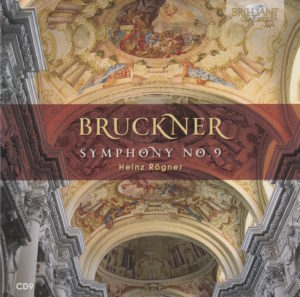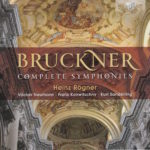 This morning’s conductor of Anton Bruckner’s unfinished Symphony No. 9 in D Minor WAB 109 (dedicated “to the beloved God”) is Heinz Rogner (1929-2001), who was born in Leipzig, Germany.
This morning’s conductor of Anton Bruckner’s unfinished Symphony No. 9 in D Minor WAB 109 (dedicated “to the beloved God”) is Heinz Rogner (1929-2001), who was born in Leipzig, Germany.
Maestro Rogner is included in a box set that bears his name in large letters called Bruckner: Complete Symphonies, which you can buy from Amazon here.
However, even though I’m up to Day 140, I’ve only heard Mr. Rogner five previous times. All other times dipping into the Rogner box set resulted in me hearing other conductors. So today is the sixth, and final, time I’ll listen to Maestro Rogner.
Prior to Day 60 (Symphony No. 4), I had never heard a performance conducted by Heinz Rogner.
But I did again on Day 76, Symphony No. 5.
Then again on Day 92, Symphony No. 6.
Then again on Day 108, Symphony No. 7.
Then again, most recently, on Day 124, Symphony No. 8.
As a reminder, this is from Rogner’s bio on Wikipedia:
From 1958 to 1962, Rögner was chief conductor of the Leipzig Radio Orchestra. From 1973 to 1993, he was chief conductor of the Berlin Radio Symphony Orchestra. In 1984, he became chief conductor of the Yomiuri Nippon Symphony Orchestra, and in 1990 took the title of permanent guest conductor.
 The great thing about the Bruckner: Complete Symphonies set is it’s from Brilliant Classics, one of the most affordable, yet high-quality record labels I’ve ever encountered. I have many box sets from Brilliant Classics, mostly because they release complete recordings – as in Complete Bach, Complete Mozart, Complete Beethoven, etc. Their prices are incredibly low compared to what you get in return, usually far less than $1 per disc.
The great thing about the Bruckner: Complete Symphonies set is it’s from Brilliant Classics, one of the most affordable, yet high-quality record labels I’ve ever encountered. I have many box sets from Brilliant Classics, mostly because they release complete recordings – as in Complete Bach, Complete Mozart, Complete Beethoven, etc. Their prices are incredibly low compared to what you get in return, usually far less than $1 per disc.
(And, no, Brilliant Classics didn’t pay me to type those words. I’m just passionate about their label.)
On to the facts of today’s recording…
Bruckner’s Symphony No. 9 in D Minor WAB 109, composed 1887-1896
Heinz Rogner conducts
Rogner used “1877/90 version, ed. Haas,” according to the CD sleeve.
Rundfunk-Sinfonie-Orchester Berlin plays
The symphony clocks in at 54:15
This was recorded 9-12 February, 1983, in (I think) Berlin, Germany
Rogner was 54 when he conducted it
Bruckner was 72 when he died before finishing the Ninth
This recording was released on the Brilliant Classics label
Bruckner wrote his symphonies in four parts. He would have this time, too. But he died before completing movement four. The time breakdown of this one (Symphony No. 9 in D Minor), from this particular conductor (Rogner) and this particular orchestra (Rundfunk-Sinfonie-Orchester Berlin) is as follows:
I. Feierlich, misterioso (D minor)…………………………………………………………………21:31
II. Scherzo. Bewegt, lebhaft (D minor); Trio. Schnell (F-sharp major)……………………………………………………………………………………………………………10:16
II. Adagio. Langsam, feierlich (E major)……………………………………………………….21:26
IV. Finale. (D minor, incomplete)……………………………………………………………………0:00
Total running time: 54:15
From the liner notes about Heinz Rogner in the section about Symphony No. 9, Dirk Stove writes,
Seen against the background of such influences, Heinz Rogner’s readings of Bruckner are very individual and easily recognisable, being characterised by sometimes quite brisk tempi, the prevalence of a soft, round and always ‘corporeal’ tone and almost three-dimensional tonal architecture.
From the liner notes about Anton Bruckner in the section about Symphony No. 9, Dirk Stove writes,
Rather than impressing individual details upon the listener, with its great arches of tension, Anton Bruckner’s Symphony No. 9 in D minor is perceived in its homogeneous entirety, as if one were seated in the middle of the nave of an imaginary church.
And now for my subjective assessment:
My Rating:
Recording quality: 5 (typical Brilliant Classics fare – crisp, clean, and exciting)
Overall musicianship: 5
CD liner notes: 4 (decent essays on each Bruckner symphony, but little information about each conductor)
How does this make me feel: 5
I agree on both counts of Mr. Stove’s liner notes.
Rogner’s tempi is quite brisk for this performance. It wraps up in just 54:15 seconds (nearly 20 minutes less than Lorin Maazel’s from Day 137!).
Also, these three movements have an ethereal quality that appeals to my soul. So I can easily see that Bruckner was writing to a higher audience (or would that be Higher Audience) than mere mortals.
Overall, this is another rousing performance from Hans Rogner and the Rundfunk-Sinfonie-Orchester. The recording was good and well balanced. The musicians were interesting. This is a majestic performance that moved me.
The ending of the Adagio is sublime. Flute, strings, horns…all combine in the most beautiful way with the flute holding the long note first, then giving way to the horn holding the long note while the strings add a pizzicato accent to the held notes.
Highly recommended.
“Huzzah!”
